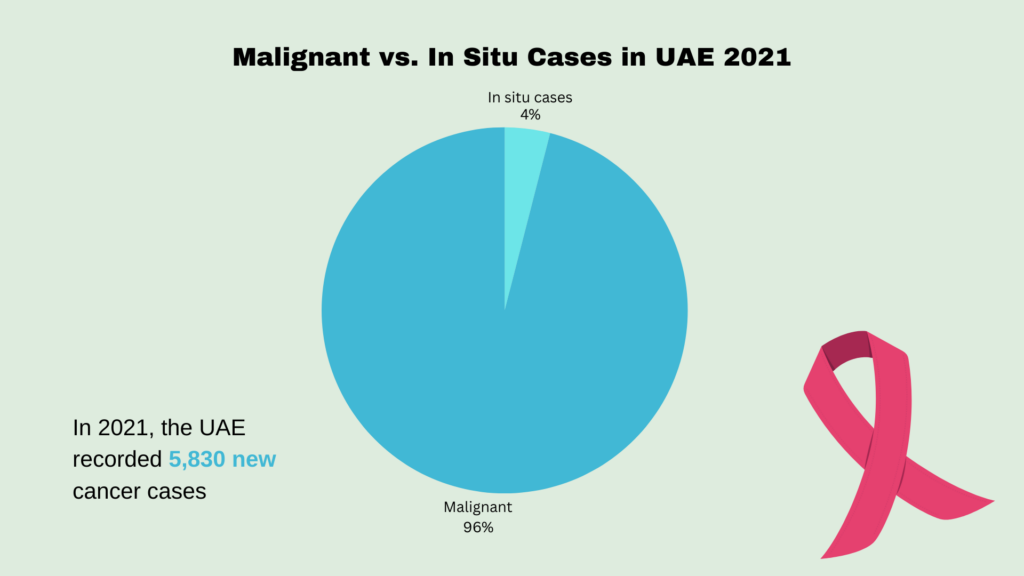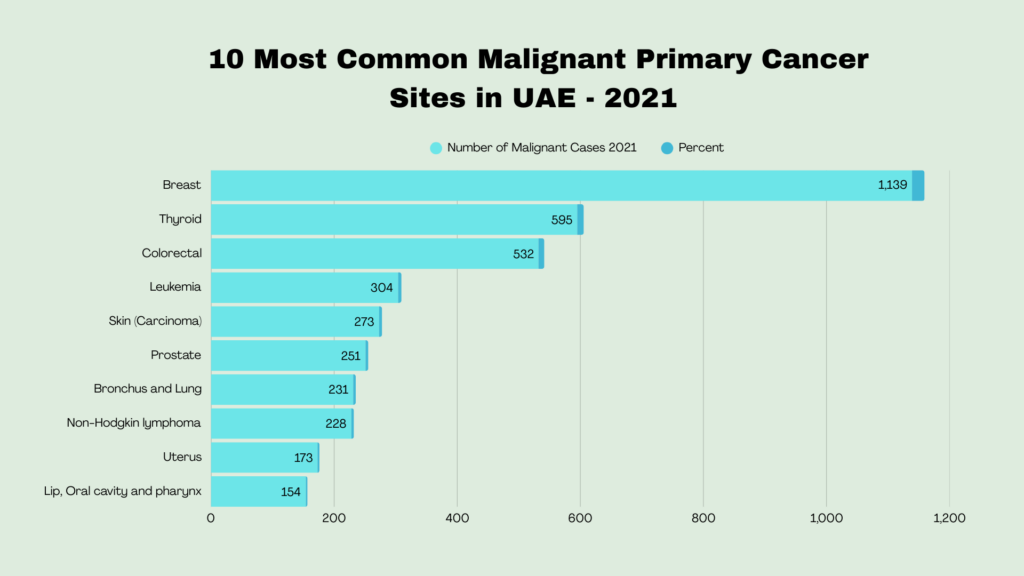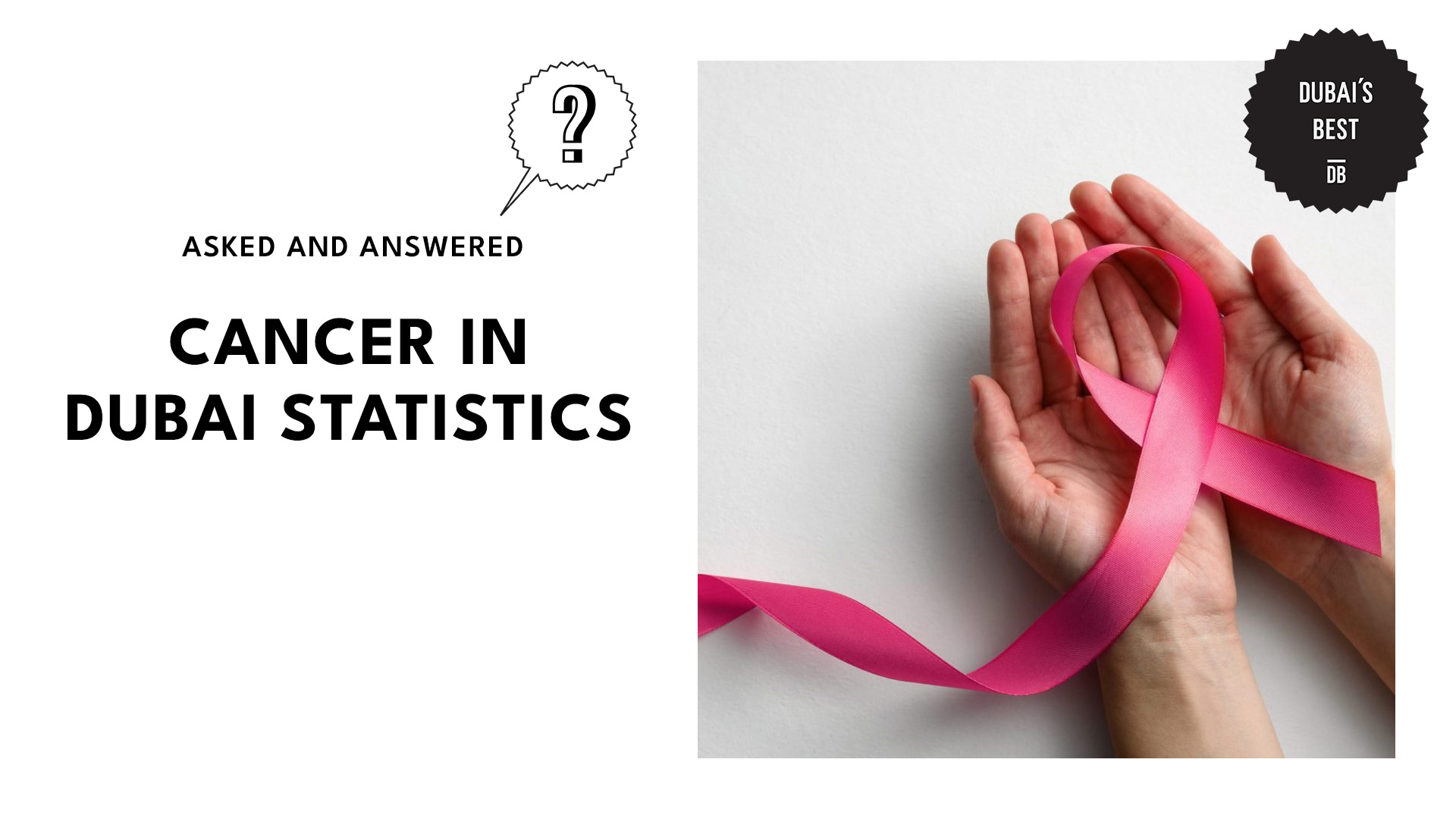Statistics and Survival – Dubai’s Battle Against Cancer
Key Insights:
- Cancer is the third-leading cause of death in the UAE, accounting for 10% of all mortality. The government aims to reduce cancer deaths by 30% by 2030.
- The UAE is at the forefront of cancer treatment in the Middle East. It has expanded from a single cancer center in 1981 to over 30 facilities, with cutting-edge treatments and expert oncologists.
- In 2019, the UAE recorded 4,633 new cancer cases, with 56.2% in women and 43.8% in men. The crude incidence rate was significantly higher in women (75.8 per 100,000) than men (31.0 per 100,000).
- The leading cancers in Dubai include breast, thyroid, colorectal, skin, leukemia, prostate, and lung cancer.
- Challenges remain in quality of care, clinical trial access, and research infrastructure.
- Programs like the Pink Caravan and Basmah Initiative focus on early detection, treatment accessibility, and public awareness.
- Cancer creates emotional and financial burdens for families and strains Dubai’s healthcare system. Increased investments in oncology infrastructure and affordable treatment options are key priorities.
- The UAE is integrating precision oncology, AI-driven diagnostics, and international research collaborations to enhance prevention and treatment.
Overview of Cancer in Dubai
In the United Arab Emirates (UAE), Cancer is the third-leading cause of death, following cardiovascular disease and injuries.
According to the National Institutes of Health, the country has had significant advancements in cancer care over the past 40 years.
From a single center in 1981, it now has over 30 cancer centers and clinics, including four comprehensive cancer centers.
In Dubai, rising cancer rates are driven by lifestyle changes, an aging population, and improved detection methods.
However, disparities in care quality, limited access to clinical trials, and insufficient research infrastructure remain as challenges. The most common cancers include breast, thyroid, colorectal, skin, leukemia, prostate, and lung cancer.
Early detection and national screening programs need improvement, with innovative, less invasive methods under consideration.
The UAE is also exploring oncology medical tourism, psycho-oncology, and precision oncology. Policymakers aim to enhance cancer care, aligning with the UAE’s vision for high-quality healthcare and reduced cancer mortality.
Key Cancer Statistics in Dubai
Cancer is a major public health concern in the UAE, accounting for 10% of all deaths and ranking as the third-leading cause of mortality. The UAE aims to reduce cancer deaths by 30% by 2030, aligning with its World-Class Healthcare agenda.
Since the establishment of Tawam Hospital in 1981, cancer care has advanced significantly. Innovations like cyberknife radiation and hematopoietic stem cell transplantation (HSTC) have greatly improved the quality of cancer care in the country.
In 2019, the UAE National Cancer Registry (UAE-NCR) recorded 4,633 new cancer cases, with 94.56% being malignant and 5.44% in situ. Cancer was more prevalent among women (56.2%) than men (43.8%).
In 2021, the UAE recorded 5,830 new cancer cases, with 96% being malignant and 4% being in situ cases. Women had higher incidence rates (108.7 per 100,000) than men (39.5 per 100,000).
Cancer caused 975 deaths, with colorectal cancer leading in fatalities. Pediatric cases made up 2.7% of malignancies.

Most Common Types of Cancer in Dubai
In Dubai, several types of cancer are more prevalent due to genetic, lifestyle, and environmental factors. Breast cancer is the most common among women, often linked to hormonal influences and late-stage detection.
Thyroid cancer is also frequently diagnosed, particularly in women, with radiation exposure and genetic predisposition playing key roles.
Colorectal cancer is rising due to sedentary lifestyles, processed food consumption, and low fiber diets. Skin cancer is influenced by high UV exposure in the UAE’s hot climate.
Leukemia affects both adults and children, with causes ranging from genetic factors to environmental exposures.
Among men, prostate cancer is a leading concern, with age and family history being primary risk factors. Lung cancer, though less prevalent, is associated with smoking and air pollution.
Early screening and awareness campaigns are crucial in reducing the impact of these cancers in Dubai.
The graph below highlights the most prevalent cancer types in the UAE in 2021, based on a report by the Ministry of Health and Prevention.

| Primary Site | Number of Malignant Cases 2021 | % |
| Breast | 1,139 | 20.3 |
| Thyroid | 595 | 10.6 |
| Colorectal | 532 | 9.5 |
| Leukemia | 304 | 5.4 |
| Skin (Carcinoma) | 273 | 4.9 |
| Prostate | 251 | 4.5 |
| Bronchus and Lung | 231 | 4.1 |
| Non-Hodgkin lymphoma | 228 | 4.1 |
| Uterus | 173 | 3.1 |
| Lip, Oral cavity and pharynx | 154 | 2.7 |
For women, below are the most common malignant primary sites in 2021 based on records from the Ministry of Health and Prevention:
| Most Common Malignant Primary Sites Among Females in UAE – 2021 | |
| Primary Site | % |
| Breast | 36.9 |
| Thyroid | 13.8 |
| Colorectal | 7.0 |
| Uterus | 5.7 |
| Cervix uteri | 4.6 |
| Skin (Carcinoma) | 3.6 |
| Ovary | 3.5 |
| Leukemia | 3.1 |
| Non-Hodgkin Lymphoma | 2.8 |
| Bronchus and Lung | 2.3 |
For men, below are the most common malignant primary sites in 2021 based on records from the Ministry of Health and Prevention:
| Most Common Malignant Primary Sites Among Males in UAE – 2021 | |
| Primary Site | % |
| Colorectal | 12.5 |
| Prostate | 9.8 |
| Leukemia | 8.2 |
| Thyroid | 6.8 |
| Skin (Carcinoma) | 6.4 |
| Bronchus and Lung | 6.3 |
| Non-Hodgkin Lymphoma | 5.6 |
| Lip, Oral Cavity & Pharynx | 4.6 |
| Kidney & Renal Pelvis | 4.2 |
| Urinary Bladder | 4.0 |
Causes and Contributing Factors of Cancer in Dubai
Cancer cases in Dubai are increasing due to a combination of lifestyle, environmental, genetic, and diagnostic factors.
Lifestyle
Smoking remains a major contributor to lung and oral cancers, while sedentary lifestyles and unhealthy diets increase the risk of colorectal and other cancers. High consumption of processed foods and obesity further exacerbate the problem.
Environment
Air pollution and exposure to harmful chemicals have been linked to various cancers, particularly in highly urbanized areas.
Genetic
A family history of cancer increases the likelihood of developing breast, ovarian, and other hereditary cancers.
Delayed Diagnosis
Many cases are diagnosed late due to cultural reluctance to seek early medical advice, reducing survival rates.
The impact of urbanization and modern lifestyles continues to shape cancer trends. This makes prevention, awareness, and early detection crucial in Dubai’s fight against the disease.
Impact of Cancer on Public Health and Society
Cancer has a profound impact on individuals, families, and Dubai’s healthcare system, creating both emotional and economic burdens.
Health Impact
Cancer patients and their families experience significant physical, emotional, and psychological stress.
Survivors often face long-term health complications and comorbidities such as cardiovascular disease and weakened immunity, requiring ongoing medical care.
Economic Impact
The cost of cancer treatments, including chemotherapy, surgery, and targeted therapies, places a financial strain on both patients and the healthcare system.
Additionally, loss of productivity due to illness and caregiving responsibilities affects family and businesses.
Healthcare System Burden
Dubai’s rising cancer rates are increasing the demand for oncology services, specialized care, and advanced treatment facilities. Expanding cancer care infrastructure and ensuring affordable access to treatment remain as key challenges.
In order to address cancer’s public health burden, early detection, prevention strategies, and improved support systems for patients and caregivers in Dubai are crucial.
Cancer Screening and Early Detection Programs in Dubai
Dubai has launched several government and private sector initiatives to promote early cancer detection and reduce mortality rates.
Here are some of the key programs:
Pink Caravan
An initiative by Friends of Cancer Patients (FOCP), the Pink Caravan offers free breast cancer screenings and awareness sessions through mobile clinics across the UAE.
They promote early detection and healthy lifestyles, urging public and private sector involvement.
During Breast Cancer Awareness Month every October, the Pink Caravan deploys over 100 mobile clinics. Beyond Pink Month, the FOCP continues to offer support and advice year-round to raise awareness and lead the fight against breast cancer.
American University of the Emirates (AUE) Pink Month
This campaign by the AUE is dedicated to breast cancer education and early detection by promoting regular self-examination to young women.
The program features screening programs, awareness sessions, and community events to promote prevention and support. AUE students also participate in breast cancer awareness presentations at Zulekha Hospitals.
Basmah Initiative
Launched by the Dubai Health Authority (DHA) in 2017, the Basmah Initiative is the UAE’s first integrated cancer care program. It covers early detection, treatment, and financial support for cancer patients.
It provides free screening for breast, colorectal, and cervical cancer and ensures comprehensive care through insurance coverage, making cancer care more accessible.
HPV Vaccination
The HPV vaccination program in Dubai helps prevent cervical cancer by providing free or subsidized vaccines to young women. Supported by the DHA, this initiative aims to reduce HPV-related cancers and promote long-term public health.
Cancer Treatment Options and Healthcare Facilities in Dubai
Dubai is a key destination for cancer treatment in the Middle East, offering cutting-edge medical technologies and specialized healthcare facilities.
For treatment options, patients have access to chemotherapy, radiation therapy, immunotherapy, and targeted therapies. Innovative treatments like robotic surgery for precision care are also available at some hospitals like American Hospital Dubai.
Here are some of the leading cancer treatment facilities in Dubai and the UAE:
- King’s College Hospital London Dubai
- Mediclinic City Hospital
- Clemenceau Medical Center Hospital (CMC)
- Burjeel Hospital for Advanced Surgery (Abu Dhabi)
- Saudi German Hospital
With advanced healthcare facilities, Dubai is a top destination for medical tourism with its state-of-the-art facilities, expert oncologists, and streamlined healthcare services.
The UAE government actively promotes medical tourism by fostering collaborations with global oncology specialists. With continuous investments in research, innovation, and international expertise, Dubai remains at the forefront of cancer care in the Middle East.
Government Efforts to Combat Cancer in Dubai
The UAE government has implemented several initiatives to reduce cancer rates and improve patient outcomes through policies, funding, and awareness programs.
National Cancer and Control Plan
The UAE’s National Cancer Control Plan aims to reduce cancer mortality rates by 2030 through early detection, prevention, and advanced treatments.
It focuses on public awareness, improved screening programs, and access to cutting-edge therapies. This plan aligns with the framework of the World Health Organization (WHO) and EMRO (WHO Regional Office for the Eastern Mediterranean).
Affordable Cancer Treatments
The Dubai Health Authority (DHA) provides subsidized or free cancer treatments for UAE nationals and select blue-collar expatriates. The government’s healthcare programs ensure access to essential care.
The Basmah Initiative, a public-private partnership, provides fully-funded screening and treatment for Dubai residents diagnosed with breast, cervical, or colorectal cancer.
The UAE healthcare system also provides comprehensive coverage, while the UAE National Cancer Registry collects and analyzes data on cancer cases in the country.
Public Awareness Campaigns
Programs like Pink Caravan and DHA-led initiatives focus on early detection, lifestyle changes, and screening programs to reduce late-stage diagnoses.
Global Collaborations
Dubai works closely with organizations like the World Health Organization (WHO) to adopt international best practices in cancer prevention and care.
For more details, visit official DHA resources and government reports on cancer control in the UAE.
Prevention Strategies for Cancer in Dubai
Reducing cancer risk in Dubai involves lifestyle changes, early detection, and minimizing environmental exposures. By adopting healthier habits, residents can significantly lower their chances of developing cancer.
Key Prevention Strategies
- Quit Smoking – Avoid tobacco use and exposure to secondhand smoke to reduce lung and oral cancer risks.
Smoking, including shisha, is prevalent in the UAE, especially among youth, despite strict regulations under Federal Law No. 15 of 2009.
- Eat a Balanced Diet – Focus on fruits, vegetables, and whole grains while limiting processed foods and excessive sugar.
- Exercise Regularly – Engaging in at least 150 minutes of moderate activity per week helps maintain a healthy weight and lower obesity-related cancer risks.
- Get Screened – Regular mammograms, colonoscopies, and HPV screenings aid in early detection and better treatment outcomes.
For men and women, the Department of Health Abu Dhabi recommends colonoscopy every 10 years or stool tests every 2 years.
For women, regular breast cancer screening is recommended for those 40 and above and mammograms every 2 years. For women ages 25 to 65 years, a pap test every 3 to 5 years is also advisable.
- Limit Exposure to Toxins – Reduce exposure to pollution, industrial chemicals, and harmful UV rays.
Future Outlook: Addressing Cancer in Dubai
Dubai is advancing cancer care through personalized medicine, genomic research, and cutting-edge technology.
The expansion of specialized cancer centers will enhance access to treatment. While AI-driven diagnostics and robotic-assisted surgeries improve accuracy and patient outcomes.
Public health campaigns will continue to raise awareness, promote early detection, and encourage healthier lifestyles.
The Dubai Health Authority (DHA) is also strengthening research collaborations to develop innovative therapies tailored to the region’s population.
With ongoing investments in medical advancements, infrastructure, and global partnerships, Dubai is set to become a leader in cancer prevention and treatment.
Through collective efforts from policymakers, healthcare providers, and the community, the fight against cancer remains hopeful. These ensure better survival rates and quality of life for patients.

